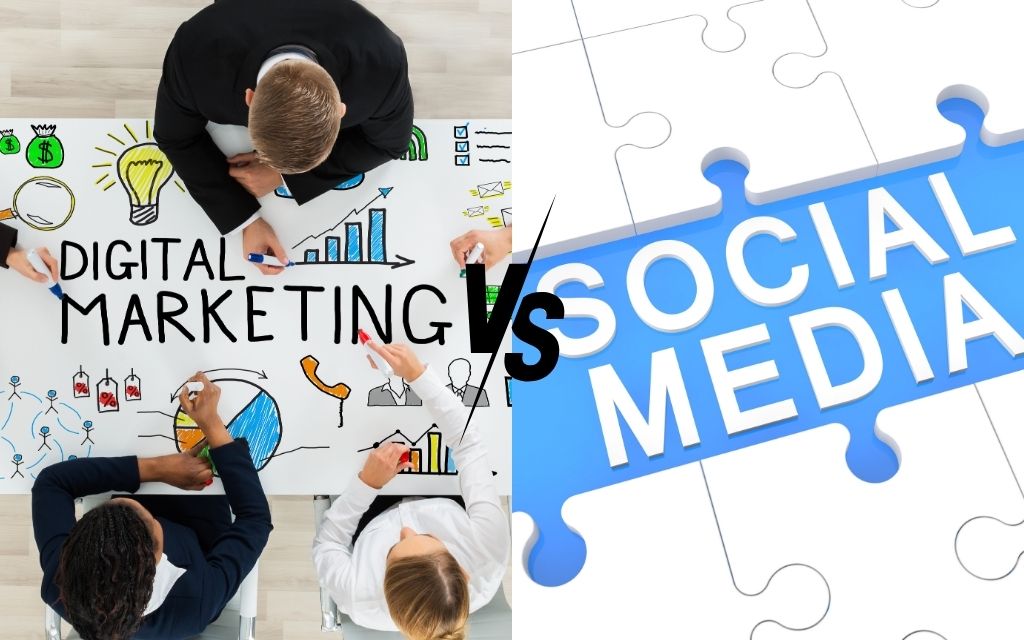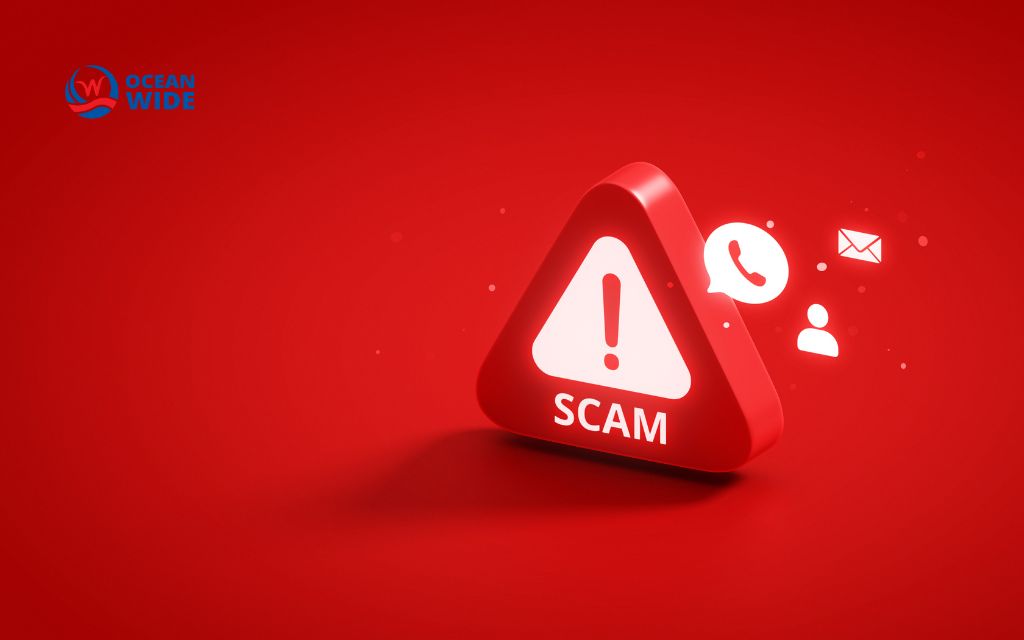In today’s fast-moving online landscape, business owners often hear the terms digital marketing and social media marketing used as if they mean the same thing. They don’t. Understanding the difference between these two approaches helps you make better decisions about where to invest your time and budget.
This guide breaks down what’s the difference between digital marketing vs social media marketing, how they work together, and what this means for Denver businesses looking to grow. Whether you run a small coffee shop or a startup, knowing which strategy fits your goals can change your results. Let’s jump right in!
What is digital marketing?
Digital marketing covers all online efforts used to reach customers.
It includes search engine optimization (SEO), pay-per-click ads, email campaigns, content creation, affiliate programs, video advertising, and text message marketing. Any channel that uses the internet to connect with people falls under digital marketing.
The goal is simple: attract people who don’t know you, turn them into leads, convert those leads into customers, and keep them coming back. Digital marketing in social media is just one part of this larger strategy.
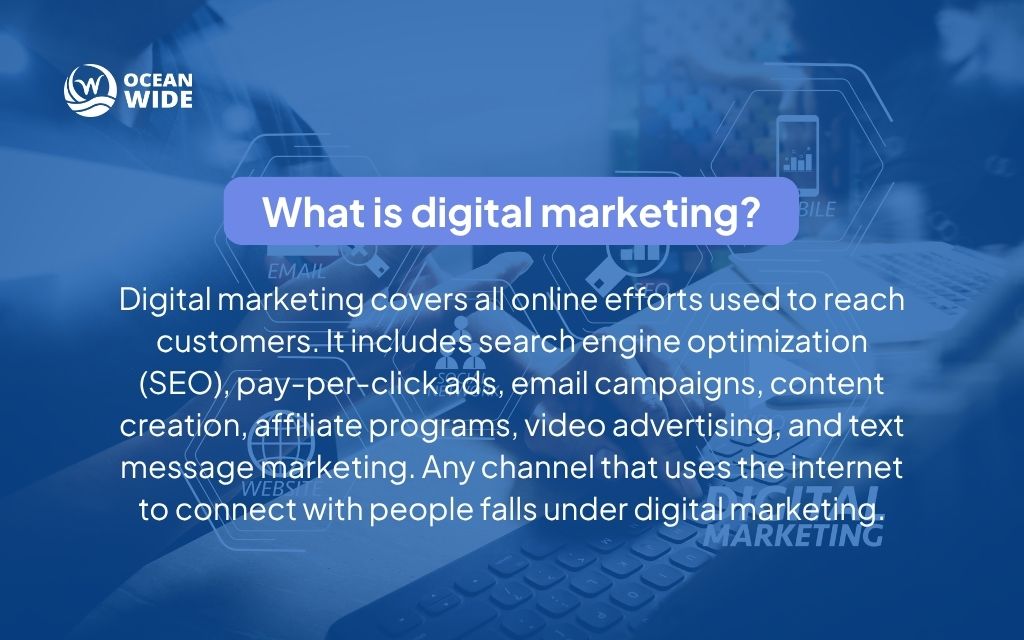
What is social media marketing?
Social media marketing focuses on platforms like Facebook, Instagram, LinkedIn, TikTok, Twitter, and Pinterest. It’s a subset of digital marketing that builds relationships through content sharing, community management, paid ads, influencer partnerships, and real-time conversations.
The definition of social media marketing centers on engagement. It’s where brands talk directly with their audience, answer questions in real time, share stories, and create content that people want to share with their friends.
The importance of social media marketing lies in its ability to humanize your brand. People buy from businesses they trust, and social platforms let you show your personality in ways other channels don’t.
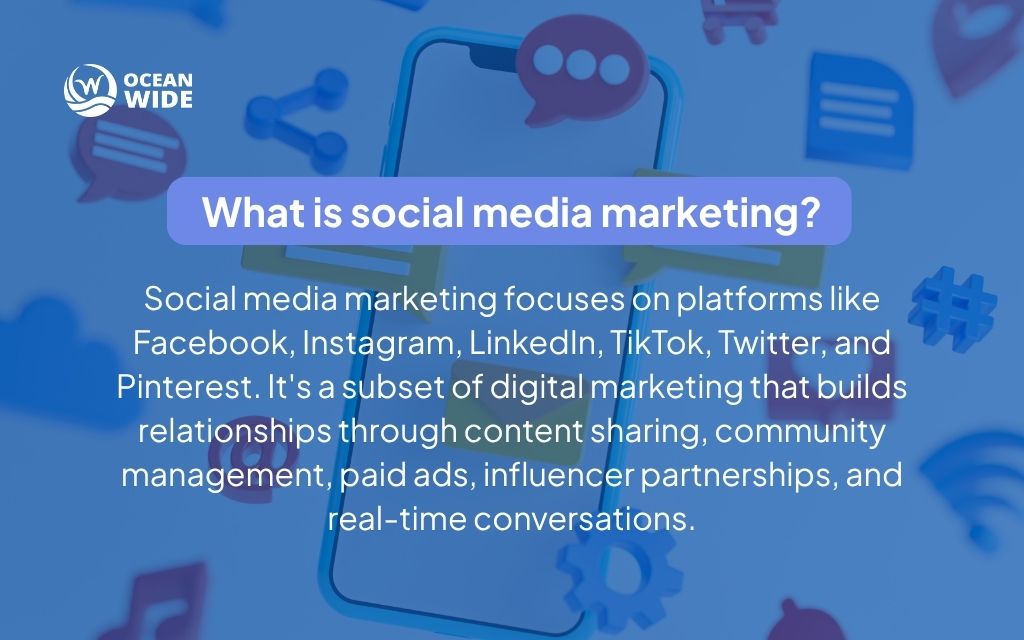
Digital marketing vs social media marketing: Key differences
Understanding the differences between these two approaches helps you allocate resources wisely and set realistic expectations for each channel. Here’s a direct comparison:
| Aspect | Digital Marketing | Social Media Marketing |
| Scope and Channels | Encompasses all digital channels including SEO, PPC, email marketing, content marketing, display ads, video advertising, affiliate marketing, and social media. Works across websites, search engines, email platforms, and digital networks. | Focuses exclusively on social platforms like Facebook, Instagram, LinkedIn, TikTok, Twitter, and Pinterest. Limited to channels designed for social interaction and content sharing. |
| Objectives and Goals | Supports the entire marketing funnel from awareness to loyalty. Attracts strangers, converts leads, retains customers, and builds long-term relationships. Designed for comprehensive customer journey management. | Excels at top-of-funnel activities like brand awareness and engagement. Builds community, starts conversations, and drives initial interest. Can support conversions through targeted ads and retargeting. |
| Tools, Metrics, and Analytics | Uses Google Analytics, search console, CRM systems, marketing automation platforms, SEO tools, and email software. Tracks website conversions, cost per acquisition, return on ad spend, customer lifetime value, and organic traffic. | Relies on Meta Business Suite, TikTok Ads Manager, LinkedIn Analytics, Hootsuite, Buffer, and Sprout Social. Measures engagement rates, follower growth, reach, impressions, shares, comments, and social conversions. |
| Budget and Resources | Requires larger investment for multi-channel campaigns including paid search, email automation, content creation, SEO tools, and analytics platforms. Typical monthly spend ranges from $1,000 to $10,000+ for small to medium businesses. | Offers accessible entry point with smaller budgets. Can start with organic content for free or run ads starting at $200-500 monthly. Scaling paid social campaigns can increase costs to several thousand dollars as reach expands. |
| Content and Format | Long-form content including blog posts (1,000-3,000 words), white papers, case studies, eBooks, detailed guides, landing pages, email sequences, and SEO-optimized resources. Focus on depth and search visibility. | Short-form content designed for quick consumption: 15-60 second videos, carousel posts, memes, Instagram Reels, stories, polls, and live sessions. Emphasis on visual appeal and immediate engagement. |

Similarities between social media marketing and digital marketing
Despite their differences, social media marketing and digital marketing share fundamental principles. Both exist to reach, engage, and convert customers online.
Customer-centric focus
Both strategies start with the same question: who is your customer?
Social media marketers study audience behavior on platforms to understand what content resonates. Digital marketers analyze website visitor patterns to see what drives conversions.
Both approaches aim to understand pain points, preferences, and motivations so you can deliver experiences that feel relevant and personal.
Data-driven decision making
Both social media and digital marketing rely on analytics to measure what works.
Metrics like click-through rate, engagement rate, conversion rate, and cost-per-acquisition appear in reports for both strategies.
When you run a Facebook ad campaign, you track clicks to your landing page. When you optimize for search engines, you track visitor conversions. Both processes use data to reveal what’s working and guide improvements.
Content as the core
Content fuels both social media marketing and digital marketing campaigns. Whether you’re writing a blog post, filming a video, designing an infographic, or crafting ad copy, quality storytelling drives awareness and conversion.
Shared tools and technologies
Many tools serve both social media and broader digital marketing efforts:
- Google Analytics tracks traffic from social platforms and organic search.
- Meta Pixel monitors conversions from Facebook and Instagram ads.
- HubSpot manages email campaigns and social media scheduling in one place.
- UTM parameters help you track which channels drive the most valuable traffic, whether from a tweet or a Google Ad.
This overlap makes integration easier and creates a complete picture of customer behavior across all touchpoints.
Aligned business goals
Both social media marketing and digital marketing exist to serve the same business objectives. They increase visibility, build trust and authority, generate qualified leads, improve customer retention, and boost return on investment.
Social media marketing helps achieve these goals through community building and engagement. Digital marketing supports them through search visibility, email nurturing, and retargeting campaigns.
The destination is the same; the paths are different.
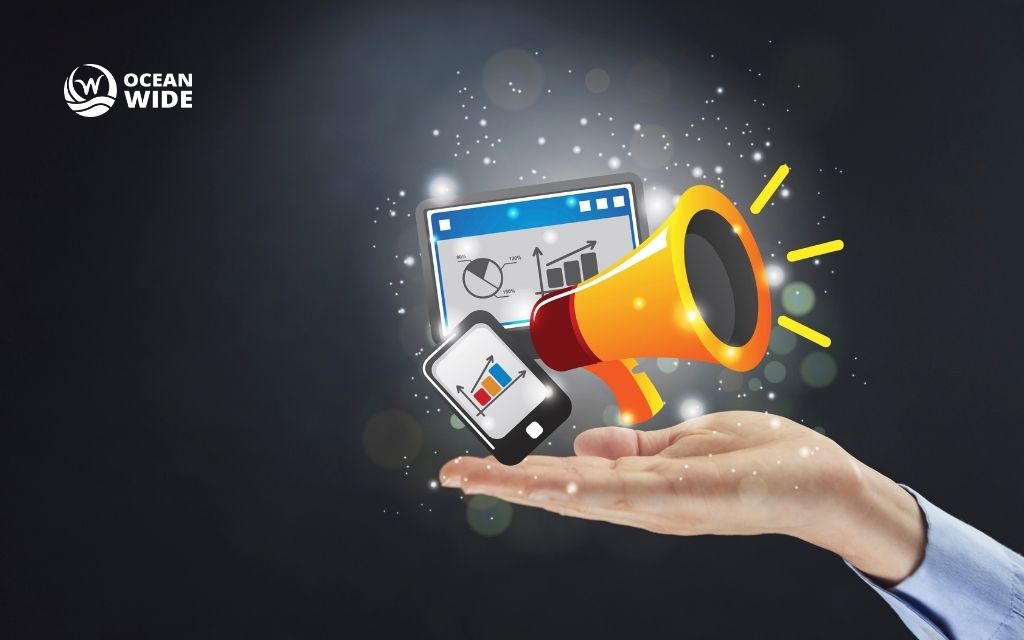
How they work together
Social media and digital marketing create better results when combined.
Social platforms amplify your digital content, bringing more eyes to your blog posts and videos. Data from social campaigns reveals what topics resonate with your audience, helping refine your SEO strategy and content calendar.
Multi-channel campaigns reinforce your message. Someone might see your Instagram ad, visit your website, read a blog post, sign up for your email list, and receive a special offer. Each touchpoint builds trust and moves them closer to becoming a customer.
Social engagement drives traffic to digital properties where you can capture leads. Someone discovers your brand through a viral TikTok video, visits your website to learn more, and signs up for your email list.
Without that social media introduction, they might never have found you.
Which one should you choose or use both?
Based on business goals and stage
Startups and small businesses often begin with social media marketing. It requires less upfront investment and delivers quick visibility. You can start posting today and begin building an audience without spending a dollar.
Established brands benefit from comprehensive digital marketing strategies. They need SEO to capture search traffic, email marketing to nurture leads, and marketing automation to scale their efforts. These tools support growth when you already have a foundation.
The best approach combines both strategies. Use social media to attract attention and start conversations. Use digital marketing to convert interest into sales and build long-term customer relationships.
Local focus for Denver businesses
Denver businesses can leverage both digital and social media marketing with a local twist.
- Use geo-targeted Facebook and Instagram ads to reach people in specific neighborhoods like Highlands, Capitol Hill, or Aurora. Run Google Ads that appear when someone searches “digital marketing for social media in Denver.”
- Incorporate local search engine optimization (SEO) by including Denver-specific keywords in your website content. Write blog posts about serving Colorado businesses.
- Share photos of recognizable Denver landmarks in your social media posts. Join local Facebook groups where your customers gather.
Conclusion
Digital marketing is a broad strategy using all online channels to attract, convert, and retain customers. Social media marketing is a focused subset that emphasizes engagement and visibility on social platforms. The difference between digital marketing and social media marketing comes down to scope and purpose.
For best results, combine both approaches to reach audiences at every stage. Social media marketing importance grows when integrated with SEO, email, and paid search. Local Denver businesses maximize results through geo-targeted campaigns and local search optimization.
The Ocean Wide – Your Trusted Digital Growth Partner
At The Ocean Wide, we help Denver businesses navigate the full spectrum of online marketing. From website design and SEO to social media management and digital advertising, we provide the complete support you need to grow.
Contact us today:
Phone: (720) 334-0899
Email: [email protected] | [email protected]
Frequently asked questions (FAQs)
Is social media marketing part of digital marketing?
Yes. Social media marketing is one of the most effective components of digital marketing. It focuses specifically on platforms designed for sharing and engagement, while digital marketing includes all online channels.
Which is better: Digital or social media marketing?
Neither is universally better. Digital marketing covers a broader scope across multiple channels, while social media offers faster engagement and relationship building. The right choice depends on your business goals, stage, and budget.
Can small businesses in Denver benefit from both?
Absolutely. Many successful Denver businesses start with social media to build visibility, then expand to SEO and paid search for conversions. Combining both creates multiple paths for customers to find and choose you.
How do I measure success?
Track engagement metrics on social platforms and conversion metrics on your website. Use tools like Google Analytics for website performance, Meta Ads Manager for social campaigns, and CRM systems to track leads and sales. Success looks different depending on your goals, so define what matters most before you start.
What is digital marketing vs social media marketing in simple terms?
Digital marketing includes everything you do online to attract and convert customers. Social media marketing is the part that happens on social platforms. Think of digital marketing as the entire strategy and social media as one important piece.
How does social media marketing work for beginners?
Start by choosing one or two platforms where your customers spend time. Create content that helps, entertains, or inspires them. Post consistently, respond to comments, and engage with other accounts in your community. As you learn what works, add paid ads to reach more people.
Why is social media marketing important for local businesses?
Social platforms let local businesses connect directly with their community, respond to customer questions in real time, and share updates instantly. For Denver businesses, social media creates visibility in specific neighborhoods and builds relationships that drive foot traffic and local loyalty.
